| Home -> Paul Elder -> Little Bronze Playfellows - The Pipes of Pan | |||
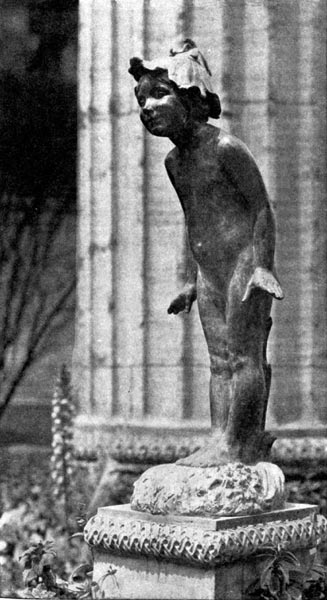 Wild Flower Who seems to say "Kiss Me" By Edward Berge |
|||
|
The Pipes O'Pan
Eleanor thought she heard the sound of a thousand crickets. She thought she heard little birds singing in their sleep. She thought she heard a little spring dripping down out of a rock. She thought she heard the blue-bells ringing and the trumpet flowers blowing and the lady-slippers dancing on the grass; she thought she heard the breezes swinging where the singing leaves were growing and she thought she saw the twinkling wood-sprites pass. She clasped her hands in excitement. The little god winked one merry eye at her. Then she saw his long graceful fingers moving up and down upon his pipes and his little puffed cheeks rising and falling. She knew that she was listening to the Pipes of Pan! "What is that delicious odor?" she wondered. For there was something sweet and spicy in the air. Piping Pan took his pipes from his lips and answered as if she had spoken. "Wildgrape blossom and fern seed," he said. "I like it very much and the music, too, Mr. Pan - must I say Mr. Pan or Piping Pan or what?" asked Eleanor. "Brother Pan, if you like. It doesn't matter. I have all sorts of names. That's one reason they call me Pan; Pan means All. You may have heard some of them: Robin Goodfellow and Search-for-Beauty and Call o' the Wild and Personal Liberty and Genius and - " "That must be very distracting and puzzling, isn't it? To have so many?" "Not in the least. I never go by names, so it doesn't matter. I think I'll come down there and sit beside you. Perhaps you'd like to play the Pipes yourself?" And he leaped lightly from the pedestal and stood before her, politely proffering the pipes. "I can't play, but I'd love just to blow in them; thank you," said Eleanor, delightedly. "Oh, yes, you can play. It just depends on what you think before you begin," said Piping Pan, taking his seat beside her. "Now, let's see - think this: "The love of little things is the gay love, and then try to play my pipes." So Eleanor took the pipes - she could feel the music in them throbbing under her fingers - and a merry little tune came tumbling out of the pipes and a merry little round fat boy came tumbling out of the air and stood on the ground before her. He had a jolly, dimpled face and he was very gay, with a ribbon round his head and a rose tied on the side of it. As he came flying downward he held out one hand as if he liked to feel the rush of air against his little palm. In the other he carried a quaint cup with a goat's head carved upon it. "Did you call me?" he asked Eleanor. Before Eleanor could say "No," Piping Pan replied, to her great surprise, "Yes; she called you." Eleanor felt that it would be impolite to contradict him; but she was sure she had not called and so she looked embarrassed and puzzled. "It was the tune you played that called him," Piping Pan explained. "You see, he always comes to the tune of Little loves are gay because that's what the artist thought when she made him." Then Eleanor recognized him. "Why, you're Flying Cupid from the next pedestal!" she cried. Cupid was pleased. "I love to be recognized," he said. "Now shall we dance a little dance or play a little game or tell a little story?" He seemed so anxious to please that Eleanor fell quite in love with him. "Oh, a story, please, Flying Cupid! I dearly love stories." "You'll not mind if I keep flying slowly about while I tell it, I hope. You see, I'm made to fly and I enjoy it more than keeping still. And hold my cup for me, please - very carefully; I hate to have the contents wasted. It's full of Joy-of-Life; and most people spill it so carelessly! And Pan, old chap, if you'll play a little jig it will help to keep me going." So Pan played a cheery whisper of a tune and Eleanor held Cupid's cup carefully. Cupid flew about softly and said: "Once my good Mother, whose name is Beauty, gave me a red rose. She told me to fly over the city and give the Rose to that home in which I should find the most affection, the least complaining, the best temper and the cheeriest humor. 'It is the Rose of Beauty, a wishing rose,' she said, 'and will give the owner his heart's desire.' So I flew over the city and found so many cheerful, happy homes that I laughed aloud for joy. But none was perfect; always somebody would complain or whine a little or somebody would take offense easily or become ill-tempered. Then it began to rain and I was flying away with my Rose, when I heard small chirruping voices in the air. 'Never mind, if we are a little bit wet,' said one, 'the shower will soon be over.' 'Certainly, my dear,' the other agreed. 'Come closer. We'll keep each other warm.' 'You are so sweet and brave, dear heart!' 'Oh, no. It is you who are so strong and kind.' 'What a good little nest this is; the water from the roof scarcely leaks into it at all.' 'The sun will shine tomorrow, and maybe there'll be crumbs thrown out besides.' 'To be sure, there may. Let's chirp and forget we are hungry. One can always make the best of things with you near by.' So I awarded the Rose of Beauty that makes wishes come true to the hungry little Wrens in their wet nest under the dripping eaves, because their home was the happiest and most loving. But, 'Bless your heart, Cupid,' said the Wrens, 'we have no need of it at all. Our wishes do come true, you see.' So I put the rose in my hair and I say to you, dear Eleanor, that your song is right! Little loves may be the gayest."
"He prayeth best who loveth best and keeping time with the words and the tune she heard the patter of tiny feet on the grass. She turned and saw the sweetest baby of all, a dear little round, cuddlesome, beauteous baby, toddling quietly past. "Oh! Wait a minute, Baby! Come here; please do!" she called. The baby stopped and looked at her. "Can't," said he. "I'm got to take care of my poor little birdie. My birdie's all tired out and needs a drink. The birdies all come to me when they need somefing. I'm the Bird Fountain Baby; that's why." Then Eleanor saw that the loving baby held a little weary bird close to his breast and was looking down upon it with the tenderest affection. "I love you," she said to the Bird Fountain Baby. "Then won't you love my birdies, please?" replied this sweetest of babies. "And tell all the other chil'ren to make bird baths and bird fountains in their gardens and on their windows - if it's only just a little bowl of water. 'Cause my birdies get so thirsty!" "Indeed, I will - and throw crumbs to them, too," she promised. And the Bird Fountain Baby smiled at her happily and toddled away on his kind errand. "Does anyone know the time?" asked Eleanor. "I suppose I ought to be going back to Piping Pan's corner very soon to wait for my grown-ups." "Time! Why, we never know that!" replied Piping Pan. "Unless, perhaps, that wee Sun Dial Baby may. I'll whistle for him." "I know the Baby you mean," said Eleanor. "But he's so little and it's so late! I think we'd better go to him, if you don't object." Eleanor had a motherly heart and liked babies to be well taken care of. The Sun Dial Baby looked as if he had always had the best of care. He was firm and shiny as a ripe apple. He had a new doll and was so happy kissing her and playing with her that he did not see his visitors at first. He was kneeling on his little pedestal giving all his attention to his dollie. Eleanor had thought he was too little to be able to tell the time, even if he did have a sun dial, and she found that she was right. As for the Sun Dial itself, of course that was of no use at night. "All he knows about time is that There is No Time Like the Present," said Eleanor, laughing. "That's what is written on the bronze base below him." "Well, that's all we need to know about time," said Piping Pan. "Is that why he's let his old dollie lie there and only loves the new one?" said Eleanor, a little teasingly. But she kissed the Sun Dial Baby on the top of his shiny head and loved him dearly. "Ah! Now I know what time it is!" exclaimed little Wild Flower. "It's moonrise!" "The moon! The moon!" they all cried out, and held up their arms in rapture. Back of the Sun Dial Baby, high in the clear, deep blue sky, the crescent moon rose slowly, serene and bright. At first Eleanor could see just the pale outline of the crescent. But as Piping Pan played to it in welcome, the curve took shape. She saw that it was a silver bow with a long moonbeam flying from it like an arrow. And glowing silver, too, and very beautiful, a graceful girl, light as a cloud, pure-browed as a star, lovely as the night, held the bow in her hand and went rising upward in the heavens. "It is Young Diana, the young moon!" whispered Piping Pan. All the children were silent, looking up at her. "Be still," he cautioned, "and she will send us moonbeams." So Eleanor was very still indeed and Diana shot moonbeams from her silver bow until the air fairly glowed with them. Then - along the path of the moonbeams, like a dream - came Youth, Youth herself, the beloved little girl from the Fountain of Youth, in the place of honor under the big tower, came to Eleanor and kissed her. "The Moon has brought her here to our Colonnade," said Piping Pan. "The Moon brings Youth to those who love her." Youth had a sweet, calm, thoughtful face. She looked as though she were grateful for all the beauty in the world and longed for it to last forever. Her hands were curved upward like little cups and the glowing moonlight filled them up to the brim. "Everything lovely fills the hands of Youth," said Piping Pan. "And the hands of those who keep Youth in their hearts," said Flying Cupid. "Look!" cried Eleanor, "flowers grow at her feet; they spring up wherever she steps!" "She is a flower herself," said Wild Flower. "I always wanted to understand you and to know you, Youth," said Eleanor. "She has come to tell you about the Fountain of Perpetual Youth," said Piping Pan. "But I thought you were going to tell me about Art," said Eleanor. "They are the same thing," said he. So Pan piped and Youth sang "The seeing heart is all of Art and Cupid carolled forth "Little loves are gay, say I," and Wild Flower murmured "In gentleness doth beauty lie," and "By patience we learn," said the Boy with the Frog, and then - "Bang!" went a rocket. Eleanor sprang forward. "What was that, Piping Pan?" she cried. "Just a rocket," said Cousin Waldemar. "Aunt Katharine was mistaken; there are to be fireworks, after all; I've come to take you to see them." Eleanor looked about her. She was in the Colonnade beside Piping Pan, and all the Little Bronze Playfellows were standing quietly and silently on their pedestals, - little bronze statues again. She blew a kiss to Piping Pan and took Cousin Waldemar's hand. "I've had a wonderful time, Cousin Waldemar," she said, gratefully. "And Piping Pan looks like you and talks like you, too." "Ah! They spoke to you, then," said Cousin Waldemar. "What did the little statues teach you, dear?" "They taught me to love them, and to know why they're so delightful," said Eleanor. "And to be glad that the artists saw beautiful dreams and patiently made them into playfellows for me." "That's all there is to learn about Art," said Cousin Waldemar, and kissed her. |
|||
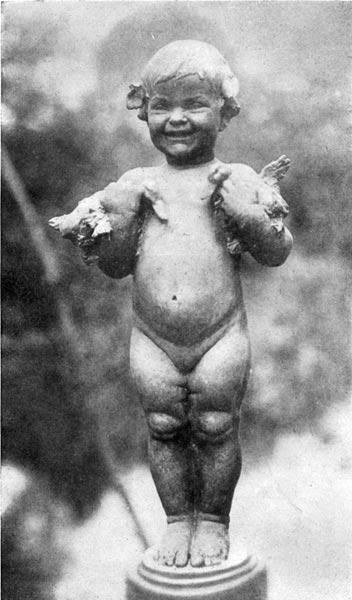 Duck Baby Who Makes Everybody Laugh By Edith Barretto Parsons |
|||
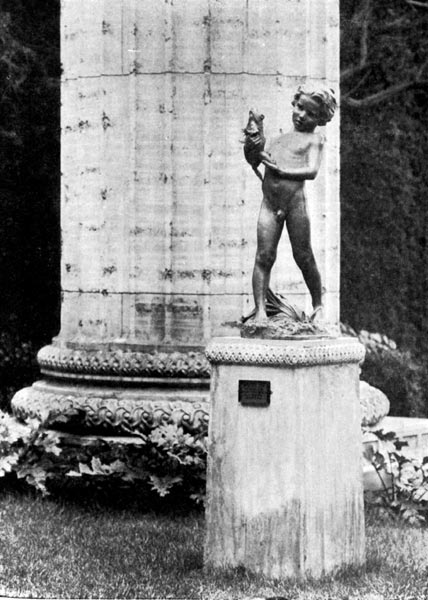 Boy with Frog Who loves the Wild Things By Edward Berge |
|||
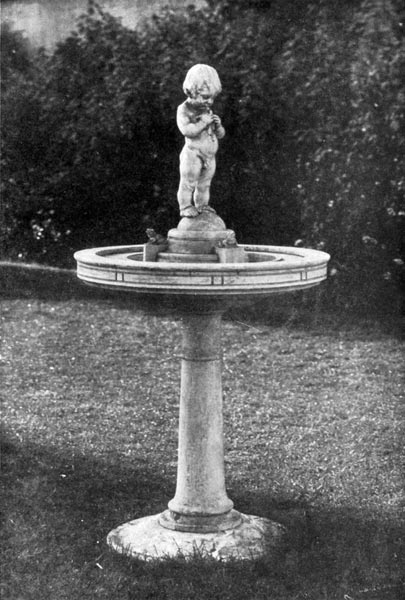 Bird Fountain Baby The Sweetest Baby of All By Caroline Everet Risque |
|||
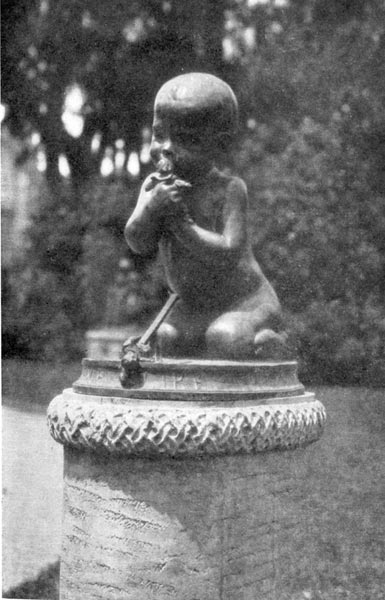 Sun-Dial Boy "There is no time like the present" By Edward Berge |
|||
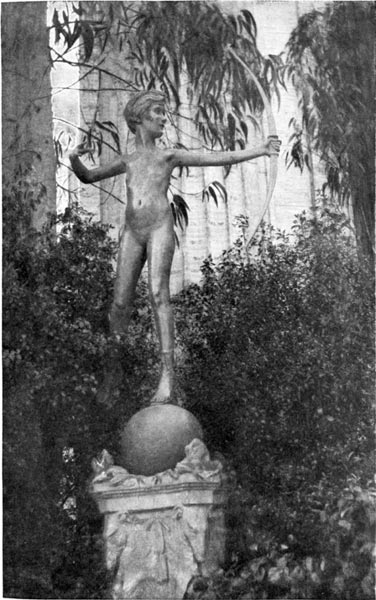 Young Diana The Maiden of the Moon By Janet Scudder |
|||
 Youth The Girl from the Fountain of Youth By Edith Woodman Burroughs |
|||
|
|
|||